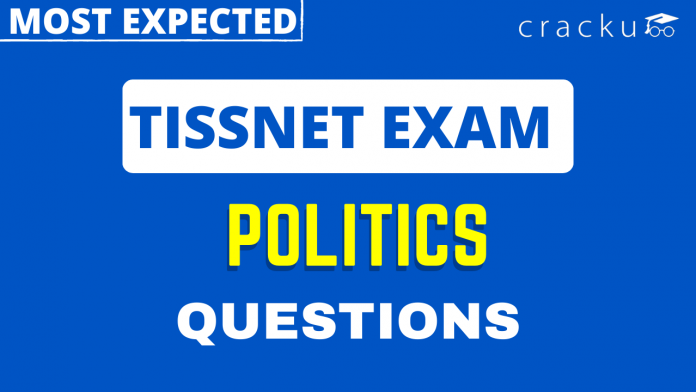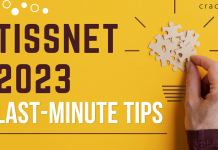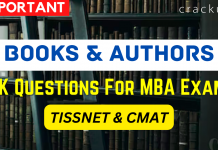TISSNET Politics Questions PDF [Most Important]
TISSNET Politics questions with a PDF by Cracku. Practice TISSNET solved Politics Questions paper tests, and these are the practice question to have a firm grasp on the Politics topic in the TISSNET exam. Top 20 very Important Politics Questions for TISSNET based on the questions asked in the previous TISSNET exam papers. Click on the link below to download the TISSNET Politics Questions with answers PDF.
Download Politics Questions for TISSNET
Enroll to TISSNET 2023 Crash Course
Question 1: Select the option which is the correct arrangement of the vice presidents of India as per their tenure of office in chronological order.
a) K. R. Narayanan, R. Venkataraman, Shanker Dayal Sharma, Bhairon Singh Shekhawat, Krishan Kant
b) R. Venkataraman, K. R. Narayanan, Shanker Dayal Sharma, Bhairon Singh Shekhawat, Krishan Kant
c) Shanker Dayal Sharma, R. Venkataraman, Krishan Kant, K. R. Narayanan, Bhairon Singh Shekhawat
d) R. Venkataraman, Shanker Dayal Sharma, K. R. Narayanan, Krishan Kant, Bhairon Singh Shekhawat
e) Shanker Dayal Sharma, R. Venkataraman, K. R. Narayanan, Krishan Kant, Bhairon Singh Shekhawat
1) Answer (D)
Solution:
R. Venkataraman ⇒ (1984-1987)
Shanker Dayal Sharma ⇒ (1987-1992)
K. R. Narayanan ⇒ (1992-1997)
Krishan Kant ⇒ (1997-2002)
Bhairon Singh Shekhawat ⇒ (2002-2007)
Hence, option d is the correct answer.
Question 2: Given below are two statements:
Statement I : Bodo is one of the scheduled languages of India.
Statement II : Nepali is one of the scheduled languages of India.
In the light of the above statements, choose the most appropriate answer from the options given below
a) Both Statement I and Statement II are correct
b) Both Statement I and Statement II are incorrect
c) Statement I is correct but Statement II is incorrect
d) Statement I is incorrect but Statement II is correct
2) Answer (A)
Question 3: Given below are two statements:
Statement I : Indian Constitution uses the word ‘minority’ to mean ‘any sections of citizens’ having a distinct language, script or culture.
Statement II : This may be a whole community living within a majority community.
In the light of the above statements, choose the correct answer from the options given below
a) Both Statement I and Statement II are true
b) Both Statement I and Statement II are false
c) Statement I is true but Statement II is false
d) Statement I is false but Statement II is true
3) Answer (A)
Question 4: Article 356 of the Constitution of India provides for
a) Reservation of the jobs for backward classes
b) Protection of religious monument
c) Imposition of President’s rule in a State
d) Right to Education
4) Answer (C)
Question 5: Which of the following do not come under the Fundamental Rights?
a) Right to Freedom
b) Right to Equality
c) Right against Exploitation
d) Right to Property
5) Answer (D)
Solution:
Right to Property does not come under the Fundamental Rights.
Question 6: Which of the following articles deals with “Right to Constitutional Remedies”?
a) Article 32
b) Article 33
c) Article 34
d) Article 35
6) Answer (A)
Solution:
Article 32 deals with “Right to Constitutional Remedies”.
Question 7: The Eighth schedule of the Indian constitution deals with ___?
a) Abolition of Zamindari system
b) Official languages
c) Administration of tribal areas in Assam, Meghalaya, Tripura and Mizoram
d) Name of States and Union Territories
7) Answer (B)
Solution:
The Eighth schedule of the Indian constitution deals with Official languages.
Question 8: Who is the second prime minister of India?
a) Jawaharlal Nehru
b) Lal Bahadur Shastri
c) Morarji Desai
d) Indira Gandhi
8) Answer (B)
Solution:
Lal Bahadur Shastri ji was the second prime minister of India.
Question 9: Which of the following finance ministers discontinued the tradition of representing the Union Budget and Railway Budget separately?
a) Morarji Desai
b) Arun Jaitley
c) Nirmala Sitharaman
d) Yashwant Sinha
9) Answer (B)
Solution:
Arun Jaitley discontinued the tradition of representing the Union Budget and Railway Budget separately.
Hence, option b is the correct answer.
Question 10: Under which article of Indian constitution a constitutional amendment bill can be represented?
a) Article 352
b) Article 360
c) Article 368
d) Article 356
10) Answer (C)
Solution:
Under Article 368 of Indian constitution a constitutional amendment bill can be represented.
Hence, option c is the correct answer.
Question 11: What is the minimum age needed to become a member of Rajya Sabha?
a) 40 years
b) 30 years
c) 35 years
d) 25 years
11) Answer (B)
Solution:
The minimum age needed to become a member of Rajya Sabha is 30 years.
Hence, option b is the correct answer.
Question 12: Which of the following is not a type of Veto power of the President?
a) Instant Veto
b) Absolute Veto
c) Suspensive Veto
d) Pocket Veto
12) Answer (A)
Solution:
Instant Veto is not a type of Veto power of the President.
Hence, option a is the correct answer.
Question 13: How many fundamental rights (including the ‘Right to property’) were provided by the constitution of India originally to its citizens?
a) 8
b) 7
c) 6
d) 9
13) Answer (B)
Solution:
Seven fundamental rights were provided by the constitution of India originally to its citizens. Later on ‘Right to property’ was removed and right now only six fundamental rights are there.
Hence, option b is the correct answer.
Question 14: Suspension of fundamental rights during emergency was taken in the Indian constitution from the constitution of which of the following countries?
a) French
b) South African
c) British
d) Germany
14) Answer (D)
Solution:
Suspension of fundamental rights during emergency was taken in the Indian constitution from the constitution of Germany.
Hence, option d is the correct answer.
Question 15: What is the tenure of a Panchayat?
a) 1 years
b) 5 years
c) 6 years
d) 4 years
15) Answer (B)
Solution:
The tenure of a Panchayat is 5 years.
Hence, option b is the correct answer.
Question 16: The Union Council of Ministers are responsible to which of the following houses?
a) Lower house
b) Upper house
c) Both option (a) and (b)
d) Neither option (a) nor (b)
16) Answer (A)
Solution:
The Union Council of Ministers are responsible to the Lower house(Lok Sabha).
Hence, option a is the correct answer.
Question 17: Imposition of president’s rule in a state is specified by which of the following articles of the Indian constitution?
a) Article 346
b) Article 353
c) Article 343
d) Article 356
17) Answer (D)
Solution:
Imposition of president’s rule in a state is specified by Article 356.
Question 18: NITI Aayog replaced the Planning Commission on which of the following dates?
a) 1st January 2017
b) 1st January 2016
c) 1st January 2015
d) 1st January 2018
18) Answer (C)
Solution:
NITI Aayog replaced the Planning Commission on 1st January 2015.
Question 19: The National Parliamentary body of China is known as _____?
a) People’s Assembly
b) People’s Council
c) State Council
d) National People’s Congress
19) Answer (D)
Solution:
The National Parliamentary body of China is known as National People’s Congress.
Question 20: What is the minimum age required to become a member of Loksabha?
a) 30 years
b) 25 years
c) 20 years
d) 23 years
20) Answer (B)
Solution:
The minimum age required to become a member of Loksabha is 25 years.





